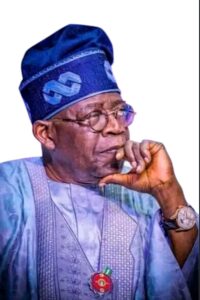

TWO PROMISING YEARS OF PRESIDENT BOLA AHMED TINUBU AND THE ALL PROGRESSIVES CONGRESS (APC)’S RENEWED HOPE AGENDA
By Musa Bakare
As Nigeria navigates complex socio-economic realities, the Renewed Hope Agenda championed by President Bola Ahmed Tinubu and the All Progressives Congress (APC) has emerged as a strategic blueprint for national development. Two years into the administration, signs of deliberate reforms and targeted interventions are becoming evident across various sectors.
 From economic recovery to security reforms, infrastructure renewal to youth empowerment, the Tinubu administration has begun laying the solid foundation for a prosperous future. The focus remains clear: restore public confidence, stimulate economic growth, and secure a better life for all Nigerians.
From economic recovery to security reforms, infrastructure renewal to youth empowerment, the Tinubu administration has begun laying the solid foundation for a prosperous future. The focus remains clear: restore public confidence, stimulate economic growth, and secure a better life for all Nigerians.
At the core of the Renewed Hope Agenda of President Tinubu is economic transformation. The administration has implemented policies aimed at attracting foreign investment, boosting local industries, and creating job opportunities. Public works programs, vocational training, and support for small and medium enterprises (SMEs) are helping reduce unemployment and drive inclusive growth.
Significant investment in transport infrastructure road, rail, and air is greatly improving connectivity and facilitating commerce. These projects are designed to integrate regions and support the movement of goods and people more efficiently.
Recognizing the power sector as critical to national productivity, the administration is pushing for increased electricity generation, improved distribution, and alternative energy adoption. The long-term goal is to reduce reliance on fossil fuels and provide stable power for homes and businesses.
Security has remained a top priority. The federal government has strengthened military and police capabilities to combat insurgency, banditry, and violent crime. Community policing and citizen law enforcement collaboration are also being promoted to enhance grassroots security.
The government is prioritizing education as a tool for national development. Investments in schools at all levels aim to improve literacy and equip young Nigerians with relevant skills. Special programs are also being introduced to prepare youths for innovation, entrepreneurship, and leadership roles.
Efforts to improve healthcare include the expansion of access to affordable services and enhanced delivery systems. Preventive health campaigns, maternal care programs, and immunization drives are improving health outcomes, especially among rural and vulnerable populations.
To cushion the effects of economic hardship, the Tinubu administration has rolled out several social welfare programs. The student loan scheme, among others, targets low-income families and aims to increase access to higher education. The administration is also working to uplift the most vulnerable through inclusive development policies.
The administration has shown commitment to good governance through transparency, accountability, and public sector reforms. Efforts to streamline judicial processes are also underway to ensure quicker access to justice and uphold the rule of law.
With a renewed focus on agriculture, the government is boosting food security and rural development. Support for farmers, modernization of farming methods, and improved access to credit are enabling Nigeria’s agricultural sector to grow and contribute more to the economy.
While national and global economic conditions remain fluid, the APC led Federal government under President Tinubu is however staying the course. The Renewed Hope Agenda is more than rhetoric, it is a policy driven effort to rebuild Nigeria and foster a nation where hope translates into opportunity.
As these reforms deepen and their impact becomes more visible years to come, Nigerians can look forward to a future anchored on stability, prosperity, and equity.
Musa Asiru Bakare is a member of the Tinubu Support Group (TSG). He writes from Lokoja, the Kogi State capital.
